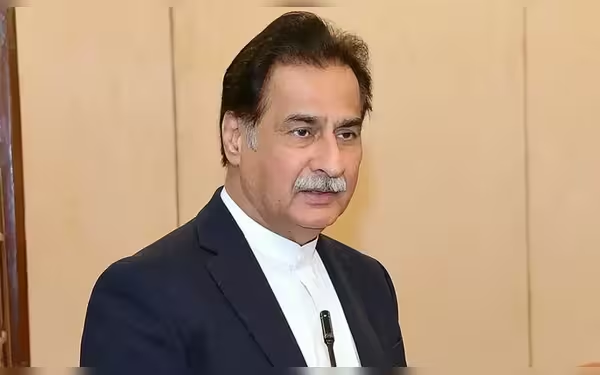Saturday, November 16, 2024 05:34 PM
Consensus Achieved on Constitutional Court Establishment in Pakistan
- All political leaders agree on constitutional court establishment.
- Speaker Sadiq emphasizes media's role in governance.
- Production orders for arrested MNAs issued without consultation.
 Image Credits: brecorder
Image Credits: brecorderNational Assembly Speaker Ayaz Sadiq announces consensus on establishing a constitutional court, emphasizing media's vital role in governance.
In a significant development for Pakistan's political landscape, National Assembly Speaker Ayaz Sadiq has announced that all political leaders, including Maulana Fazlur Rehman, have reached a consensus on the establishment of a constitutional court. This agreement is rooted in the Charter of Democracy, a pivotal document aimed at promoting democratic governance in the country. The Speaker made these remarks during a meeting with the executive body members of the Parliamentary Reporters Association (PRA) at Parliament House.
During the meeting, Speaker Sadiq addressed various queries regarding potential constitutional amendments. He expressed his readiness to act as a mediator between the government and the opposition, highlighting the importance of collaboration in the legislative process. Although he acknowledged having a general understanding of the amendment drafts, he clarified that they are still in the early stages of development.
Furthermore, the Speaker underscored the vital role of the press gallery in Parliament, stating, "Journalists in the Press Gallery play a pivotal role in disseminating the proceedings of the House to the public, fulfilling an important responsibility." He assured that the National Assembly Secretariat is dedicated to providing all necessary facilities to reporters, enabling them to perform their duties effectively.
In response to questions regarding the recent arrests of Members of the National Assembly (MNAs), Speaker Sadiq described the situation as unfortunate. He pointed out that production orders for the arrested MNAs were issued without prior consultation, leading to the declaration of Parliament Lodges as a sub-jail. The Speaker took immediate action by contacting the Inspector General of Islamabad to ensure that the arrested members were treated with dignity and respect. He noted that the members, who were brought to attend the session under production orders, expressed their gratitude for the treatment they received.
Reflecting on the previous government's handling of similar situations, the Speaker remarked that production orders for detained members were not issued, highlighting a shift in approach. He commended Federal Ministers Azam Nazeer Tarar and Mohsin Naqvi for their effective management of the situation and informed the media that an initial report on the matter had already been prepared.
When discussing the chairmanship of the Public Accounts Committee (PAC), Speaker Sadiq emphasized that the PAC is a collective entity belonging to all parties, not just one. He reiterated that the opposition has been consistently requested to submit a panel of names for the chairmanship, in line with established traditions.
Regarding the scheduling of National Assembly sessions, the Speaker reiterated that the authority to convene or adjourn a session rests with the government. He also acknowledged the positive developments in the country’s economy, expressing optimism that further good news regarding economic improvements would emerge during the current government’s term.
The establishment of a constitutional court represents a crucial step towards strengthening Pakistan's democratic framework. As political leaders come together to address pressing issues, it is essential for the public to remain informed and engaged. The role of the media, as highlighted by Speaker Sadiq, is indispensable in ensuring transparency and accountability in governance. As the nation moves forward, the hope is that these developments will pave the way for a more robust and resilient democratic process.













